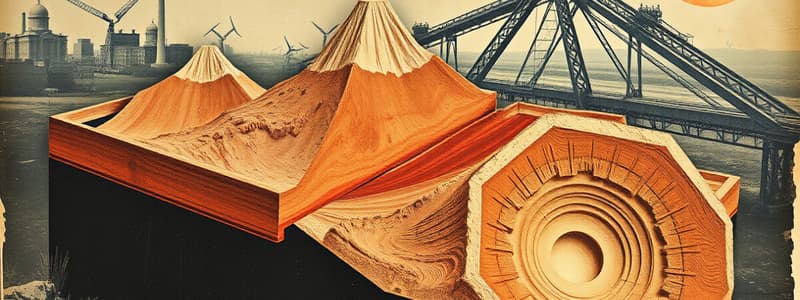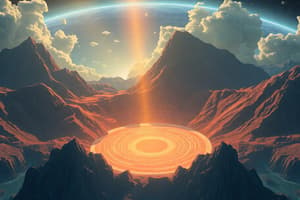Podcast
Questions and Answers
The theory of plate tectonics suggests that about 200 million years ago, all of Earth's land was confined to a single continent called?
The theory of plate tectonics suggests that about 200 million years ago, all of Earth's land was confined to a single continent called?
- Eurasia
- Laurasia
- Gondwanaland
- Pangaea (correct)
Which of the following is an example of an epeirogenic process?
Which of the following is an example of an epeirogenic process?
- A large plateau forms in the interior of a continental plate when a large section of the plate rises evenly due to an even expansion of the underlying mantle. (correct)
- Mountains form along a convergent plate boundary when an oceanic plate slips beneath a continental plate, resulting in an upward force on the continental plate.
- Mountains form along a convergent plate boundary when two plates collide, causing rock to bunch and buckle upward.
- A rift valley forms at a divergent boundary where two plates are stretched apart.
Plate divergence is best described as a/an _______ process.
Plate divergence is best described as a/an _______ process.
taphrogenic
Mountain ranges that form close to a subduction zone are likely to experience?
Mountain ranges that form close to a subduction zone are likely to experience?
All of the following are extrusive landforms except?
All of the following are extrusive landforms except?
Which type of seismic waves result from interference between S waves and P waves?
Which type of seismic waves result from interference between S waves and P waves?
Which of the following geological features forms at a subduction zone between an oceanic and a continental plate?
Which of the following geological features forms at a subduction zone between an oceanic and a continental plate?
An enormous wave generated by an earthquake beneath the seafloor is known as a?
An enormous wave generated by an earthquake beneath the seafloor is known as a?
Where is the youngest crust on Earth most likely located?
Where is the youngest crust on Earth most likely located?
_______ is the point where some region of the lithosphere reaches its ultimate elevation and stops rising.
_______ is the point where some region of the lithosphere reaches its ultimate elevation and stops rising.
Which natural process is responsible for ridge push?
Which natural process is responsible for ridge push?
Which force is responsible for pulling a plate downward into the asthenosphere?
Which force is responsible for pulling a plate downward into the asthenosphere?
Which statement accurately describes a P wave?
Which statement accurately describes a P wave?
What can you conclude about the oceanic crust in the image?
What can you conclude about the oceanic crust in the image?
At a fault block, one portion of the block moves upward while the adjacent portion moves downward. What is the upper portion called?
At a fault block, one portion of the block moves upward while the adjacent portion moves downward. What is the upper portion called?
Which of the following is responsible for about half of the heat generated by Earth's core?
Which of the following is responsible for about half of the heat generated by Earth's core?
The image shows that landmasses now separated by oceans fit together like puzzle pieces and have fossils of the same organisms. These clues are evidence of?
The image shows that landmasses now separated by oceans fit together like puzzle pieces and have fossils of the same organisms. These clues are evidence of?
Which type of plate boundary does the image show?
Which type of plate boundary does the image show?
A person lives in a new structure that complies with modern building codes with regard to earthquake safety. What is the best place for this person to take cover during an earthquake?
A person lives in a new structure that complies with modern building codes with regard to earthquake safety. What is the best place for this person to take cover during an earthquake?
Which type of volcano has gentle slopes and forms at a divergent plate boundary?
Which type of volcano has gentle slopes and forms at a divergent plate boundary?
Flashcards
Plate Tectonics
Plate Tectonics
The theory explaining the movement of the Earth’s lithospheric plates.
Epeirogenic Process
Epeirogenic Process
A process forming large plateaus due to even expansion of the underlying mantle.
Plate Divergence
Plate Divergence
A taphrogenic process involving the stretching and pulling apart of tectonic plates.
Continental Shelf
Continental Shelf
Signup and view all the flashcards
Tsunami
Tsunami
Signup and view all the flashcards
Rayleigh Waves
Rayleigh Waves
Signup and view all the flashcards
Youngest Oceanic Crust
Youngest Oceanic Crust
Signup and view all the flashcards
Oceanic Crust
Oceanic Crust
Signup and view all the flashcards
Isostatic Equilibrium
Isostatic Equilibrium
Signup and view all the flashcards
Buoyancy and Gravity
Buoyancy and Gravity
Signup and view all the flashcards
P Waves
P Waves
Signup and view all the flashcards
Horst
Horst
Signup and view all the flashcards
Graben
Graben
Signup and view all the flashcards
Ridge Push
Ridge Push
Signup and view all the flashcards
Shield Volcanoes
Shield Volcanoes
Signup and view all the flashcards
Study Notes
Plate Tectonics and Continental Formation
- About 200 million years ago, Earth's land was unified as a single continent called Pangaea.
- The theory of plate tectonics explains the movement of the Earth’s lithospheric plates.
Geological Processes
- An epeirogenic process results in large plateaus forming due to even expansion of the underlying mantle.
- Plate divergence is a taphrogenic process, involving the stretching and pulling apart of tectonic plates.
Features of Plate Boundaries
- Mountain ranges near subduction zones often experience significant volcanic activity.
- At subduction zones between oceanic and continental plates, the geological feature forming is the continental shelf.
Earthquake Effects
- An enormous wave generated by undersea earthquakes is termed a tsunami.
- Rayleigh waves result from interactions between S waves and P waves during seismic events.
Oceanic Crust Characteristics
- The youngest oceanic crust is typically found at divergent boundaries in oceanic regions, where new crust is formed.
- The oceanic crust is denser than the continental crust and exerts greater downward force.
Uplift and Isostasy
- Isostatic equilibrium is reached when a region of the lithosphere stops rising due to balancing forces.
- Buoyancy and gravity are critical forces in the movement and stability of tectonic plates.
Seismic Waves
- P waves can travel through both liquids and solids, moving particles to create compressional waves.
- Love waves and Rayleigh waves are other types of seismic waves generated during earthquakes.
Faults and Plate Movements
- In fault blocks, the upper portion that moves upward is called the horst, while the downward-moving portion is the graben.
- Ridge push is primarily driven by seafloor spreading, affecting plate dynamics.
Safety Measures During Earthquakes
- The safest place to take cover during an earthquake is under a table, offering protection from falling debris.
Volcanic Formation
- Shield volcanoes feature gentle slopes and typically form at divergent plate boundaries due to lava flows.
Studying That Suits You
Use AI to generate personalized quizzes and flashcards to suit your learning preferences.




